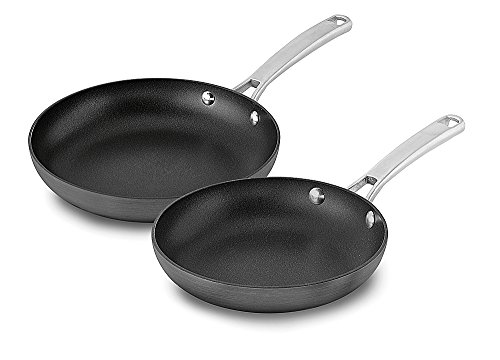Teflon® is a registered trademark of DuPont and a brand name for polytetrafluoroethylene (PTFE) a nonstick finish. While Calphalon cookware features polytetrafluoroethylene-based nonstick finishes, we are not associated with, nor do we use, Teflon® branded products.

Safe Cooking Practices with Calphalon Non-Stick Cookware
To cook safely with Calphalon non-stick cookware:
- Do not exceed Calphalon’s recommended temperatures, ranging from 400 to 500°F.
- Do not use Calphalon non-stick cookware in the broiler.
- Do not use high heat on the stove (high enough to sear meat); instead, choose low to medium.
- Do not use metal utensils that could scratch the surface.
If you scratch the non-stick coating, or you notice the surface starting to flake, replace the pan.
So, is Calphalon non-stick cookware safe?
Yes, as long as the pan was manufactured after 2013, and you use it as recommended.
Need more reassurance? Here’s the complete statement from the American Cancer Society (source):
“Other than the possible risk of flu-like symptoms from breathing in fumes from an overheated [PTFE]-coated pan, there are no proven risks to humans from using cookware coated with [PTFE] (or other non-stick surfaces). While PFOA was used in the past in the US in making [PTFE], it is not present (or is present in extremely small amounts) in [PTFE]-coated products.”
Precautions to Take When Using Calphalon Cookware
To ensure the safety of your Calphalon cookware, here’s a list of precautions to take when using it:
- Don’t preheat empty non-stick cookware. It can get extremely hot quickly. Always place liquid or food in the pan to absorb excess heat.
- Keep your cooktop on low to medium heat. High heat is only necessary for boiling.
- Cook in a well-ventilated area in case of accidental overheating. Open windows and exhaust fans are ideal.
- Replace non-stick cookware when it shows signs of wear-and-tear.
- Don’t use metal utensils.
- Always hand wash your non-stick cookware; dishwasher detergent could wear down the cooking surface over time.
- Do not broil with it or cook over a campfire because you can’t control the temperature.
Calphalon and All-Clad Hard-anodized Non-stick Review
FAQ
Are Calphalon pans toxic free?
Are Calphalon pans safe if scratched?
When did Calphalon stop using PFOA?
When should I throw away my Calphalon pans?
